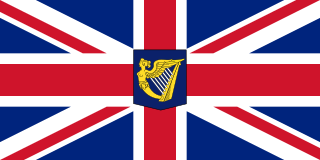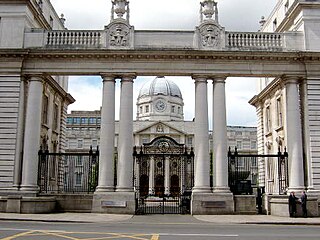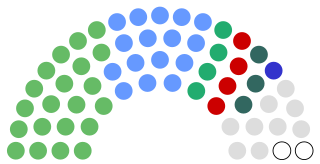Related Research Articles

The Government of Ireland Act 1920 was an Act of the Parliament of the United Kingdom. The Act's long title was "An Act to provide for the better government of Ireland"; it is also known as the Fourth Home Rule Bill or (inaccurately) as the Fourth Home Rule Act. The Act was intended to partition Ireland into two self-governing polities: the six north-eastern counties were to form "Northern Ireland", while the larger part of the country was to form "Southern Ireland". Both territories were to remain part of the United Kingdom of Great Britain and Ireland and provision was made for their future reunification through a Council of Ireland. The Act was passed by the British Parliament in November 1920, received royal assent in December and came into force on 3 May 1921.

The Irish Republic was an unrecognised revolutionary state that declared its independence from the United Kingdom in January 1919. The Republic claimed jurisdiction over the whole island of Ireland, but by 1920 its functional control was limited to only 21 of Ireland's 32 counties, and British state forces maintained a presence across much of the north-east, as well as Cork, Dublin and other major towns. The republic was strongest in rural areas, and through its military forces was able to influence the population in urban areas that it did not directly control.

Southern Ireland was the larger of the two parts of Ireland that were created when Ireland was partitioned by the Government of Ireland Act 1920. It comprised 26 of the 32 counties of Ireland or about five-sixths of the area of the island, whilst the remaining six counties, which occupied most of Ulster in the north of the island, formed Northern Ireland. Southern Ireland included County Donegal, despite it being the largest county in Ulster and the most northerly county in all of Ireland.
The Second Dáil was Dáil Éireann as it convened from 16 August 1921 until 8 June 1922. From 1919 to 1922, Dáil Éireann was the revolutionary parliament of the self-proclaimed Irish Republic. The Second Dáil consisted of members elected at the 1921 elections, but with only members of Sinn Féin taking their seats. On 7 January 1922, it ratified the Anglo-Irish Treaty by 64 votes to 57 which ended the War of Independence and led to the establishment of the Irish Free State on 6 December 1922.
A number of legislatures have existed in Ireland since mediaeval times. The first Irish legislature was the Parliament of Ireland. However, after its abolition, in 1801, there was no legislature in Ireland, of any kind until 1919. Since that date a number of legislatures have existed on the island.
There were two Governments of the 6th Dáil, which was elected at the September 1927 general election held on 15 September 1927. The 4th Executive Council and the 5th Executive Council were both minority governments of Cumann na nGaedheal led by W. T. Cosgrave as President of the Executive Council.
The Provisional Government of Ireland was the provisional government for the administration of Southern Ireland from 16 January 1922 to 5 December 1922. It was a transitional administration for the period between the ratification of the Anglo-Irish Treaty and the establishment of the Irish Free State. Its legitimacy was disputed by the Anti-Treaty members of Dáil Éireann.

The Parliament of Southern Ireland was a Home Rule legislature established by the British Government during the Irish War of Independence under the Government of Ireland Act 1920. It was designed to legislate for Southern Ireland, a political entity which was created by the British Government to solve the issue of rising Irish nationalism and the issue of partitionism, while retaining the whole of Ireland as part of the United Kingdom.

Seanad Éireann was the upper house of the Oireachtas (parliament) of the Irish Free State from 1922 to 1936. It has also been known simply as the Senate, First Seanad, Free State Senate or Free State Seanad. The Seanad was established under the 1922 Constitution of the Irish Free State. A number of constitutional amendments were made to change the manner of its election and its powers. It was eventually abolished in 1936 when it attempted to obstruct constitutional reforms favoured by the government. It sat, like its modern successor, in Leinster House.
The Third Dáil was elected at the general election held on 16 June 1922. This election was required to be held under the Anglo-Irish Treaty signed on 6 December 1921. It first met on 9 September and until 6 December 1922, it was the Provisional Parliament or the Constituent Assembly of Southern Ireland. From 6 December 1922, it was the lower house of the Oireachtas of the Irish Free State, until its dissolution on 9 August 1923.

The Oireachtas of the Irish Free State was the legislature of the Irish Free State from 1922 until 1937. It was established by the 1922 Constitution of Ireland which was based from the Anglo-Irish Treaty. It was the first independent Irish Parliament officially recognised outside Ireland since the historic Parliament of Ireland which was abolished with the Acts of Union 1800.
The 1921 Irish elections took place in Ireland on 24 May 1921 to elect members of the House of Commons of Northern Ireland and the House of Commons of Southern Ireland. These legislatures had been established by the Government of Ireland Act 1920, which granted Home Rule to a partitioned Ireland within the United Kingdom.

The 1922 Irish general election took place in Southern Ireland on Friday, 16 June. The election was separately called by a resolution of Dáil Éireann on 19 May and by an order of the Provisional Government on 27 May. The body elected was thus both the Third Dáil and provisional parliament replacing the parliament of Southern Ireland, under the provisions of the 1921 Anglo-Irish Treaty to elect a constituent assembly paving the way for the formal establishment of the Irish Free State. From 6 December 1922, it continued as the Dáil Éireann of the Irish Free State.
North Dublin, a division of County Dublin, is a former parliamentary constituency which returned one Member of Parliament (MP) to the House of Commons of the United Kingdom from 1885 until 1922. From 1918 to 1921, it was also used as a constituency for Dáil Éireann. From the dissolution of 1922, the area was not represented in the UK Parliament.
National University of Ireland (NUI) is a university constituency in Ireland, which currently elects three senators to Seanad Éireann. Its electorate is the graduates of the university, which has a number of constituent universities. It previously elected members to the House of Commons of the United Kingdom (1918–1921), to the House of Commons of Southern Ireland (1921) and to Dáil Éireann (1918–1936).
Niamh Cosgrave is a former Fine Gael politician from Dublin, Ireland. She campaigned for victims of the Hepatitis C blood contamination scandal, and was the subject of a book on this. She was briefly a member of the second house of the Irish parliament, and, for several years, of Dublin City Council, which, in a very rare move, removed her for non-attendance. She later moved to France, where she survived a serious attack; she was subsequently the subject of a TV documentary.
Dublin University is a university constituency in Ireland, which currently elects three senators to Seanad Éireann. Its electorate comprises the undergraduate scholars and graduates of the University of Dublin, whose sole constituent college is Trinity College Dublin, so it is often also referred to as the Trinity College constituency. Between 1613 and 1937 it elected MPs or TDs to a series of representative legislative bodies.

Donal O'Callaghan was an Irish Sinn Féin politician and Lord Mayor of Cork from 1920 to 1924.

Seanad Éireann is the upper house of the Oireachtas, which also comprises the President of Ireland and Dáil Éireann.
The 1922 Seanad was the part of the Seanad of the Irish Free State (1922–1936) in office from the establishment of the Seanad in 1922 to the 1925 Seanad election. Elections to the Seanad, the Senate of the Oireachtas, took place on a triennial basis, with senators elected in stages. The 1922 Seanad included 30 members nominated by the President of the Executive Council and the 30 members elected by the Dáil. It was first constituted on 8 December 1922.
References
- Report of the Proceedings of the Irish Convention. Command papers. Vol. Cd.9019. Dublin: HMSO. 1918. Retrieved 11 September 2020.
- "Government of Ireland Act, 1920 [as enacted]". legislation.gov.uk . Retrieved 16 September 2020.
- "Election of Senators (Southern Ireland) Order, 1921". The London Gazette (32307): 3384–3387. 29 April 1921. Retrieved 11 September 2020.
Citations
- 1 2 3 "The Southern Irish Parliament; Formal Opening Ceremony" . The Irish Times. 29 June 1921. p. 5.
- 1 2 3 4 5 "Meeting of Southern Parliament" . The Irish Times. 14 July 1921. p. 4.
- ↑ Cd.9019 p.13
- ↑ O'Flanagan, J. Roderick (1870). The Lives of the Lord Chancellors and Keepers of the Great Seal of Ireland, from the earliest times to the reign of Queen Victoria. Vol. v.1. London: Longmans, Green. p. 14 – via Internet Archive.
- ↑ Election of Senators (Southern Ireland) Order 1921, ss. 2, 6, 19
- ↑ Election of Senators (Southern Ireland) Order 1921, s.14; "Irish Senates (Proportional Representation) Order, 1921". The London Gazette (32307): 3400–3407. 29 April 1921. Retrieved 11 September 2020.
- ↑ Election of Senators (Southern Ireland) Order, 1921 s.8(1)
- 1 2 3 "Elections to Southern Senate". Digital Repository of Ireland. Retrieved 10 September 2020.
- ↑ "Order prohibiting elections to Southern Senate". Digital Repository of Ireland. Retrieved 10 September 2020.
- 1 2 Cd.9019 pp.52–53
- ↑ Dunraven, [4th] Earl of (1922). Past Times and Pastimes. Vol. II. London: Hodder and Stoughton. p. 73.
{{cite book}}: CS1 maint: numeric names: authors list (link) - 1 2 Whyte, Nicholas (17 February 2002). "The Senate of Southern Ireland, 1921". Northern Ireland elections. Access Research Knowledge. Retrieved 8 March 2004.
- ↑ "Senate of Southern Ireland". Debrett's House of Commons. London: Dean. 1922. p. 278.
- 1 2 "1922 Seanad Members". Members Database. Oireachtas. Retrieved 7 September 2013.
- ↑ "Past Presidents". Dublin Chamber of Commerce. Archived from the original on 19 May 2011. Retrieved 5 February 2011.
- ↑ O'Day, Alan; Fleming, Neil (11 June 2014). Longman Handbook of Modern Irish History Since 1800. Routledge. ISBN 9781317897118 – via Google Books.
- ↑ "Papers of George O'Callaghan-Westropp (1864–1944)". UCD. pp. IE UCDA P38. Retrieved 6 September 2013.
- ↑ The Christian advocate. Vol. 95. Hunt & Eaton. 1920. p. 993.
- ↑ "Remembrance Day". The Irish Law Times and Solicitors' Journal. 71: 323. 1937.
- ↑ "The Incorporated Law Society of Ireland". The Irish Law Times and Solicitors' Journal. 55: 124. 1921.
- ↑ B., J. W.; T. G. Moorehead (23 October 1937). "Obituary: Sir John William Moore". British Medical Journal. 2 (4007): 831–834. doi:10.1136/bmj.2.4007.831. PMC 2087590 .
- ↑ Crawley, Frank C.; H. C. Drury; William Pearson; W. Boxwell (February 1933). "In memoriam. Sir William Taylor (1871–1933)". Irish Journal of Medical Science. 8 (2): 86–90. doi:10.1007/BF02954546. ISSN 1863-4362. S2CID 71882024.
- 1 2 "The Southern Irish Parliament; Election of Senators" . The Irish Times. 28 May 1921. p. 4. Retrieved 11 September 2020.
- ↑ "Parliament of Southern Ireland; Election of Senators" . The Irish Times. 8 June 1921. p. 6. Retrieved 11 September 2020.
- ↑ Maume, Patrick (1999). The long gestation: Irish nationalist life 1891–1918. Gill & Macmillan. p. 101.
- ↑ "Irish point of view on new tillage rules; Rt. Hon. Walter McMurrough Kavanagh Expresses Opinion With Regard to Compulsory Tillage Regulations in Ireland Farmer's Comments How Regulations Appear to an Irish Landowner". Christian Science Monitor . Boston. 28 March 1917. p. 3.
- ↑ "Obituary: Sir Thomas Stafford, Bt., F.R.C.S.I". British Medical Journal. 1 (3881): 1102. 25 May 1935. doi:10.1136/bmj.1.3881.1102. PMC 2460354 . PMID 20779108.
- ↑ Waldron, Laurence A. (11 June 1921). "Letters to the Editor: The Southern Senate" . The Irish Times. p. 6. Retrieved 15 September 2020.